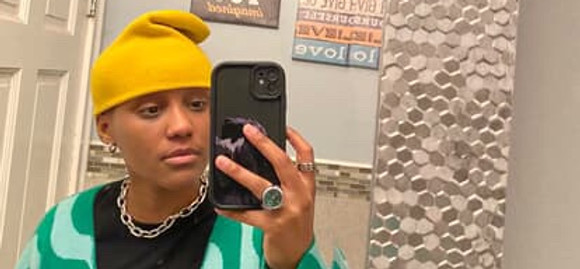Body Misread:
Self-Advocacy in a Broken System
An Interview with Deja Wilson
By Sarah Downey

“The language of friendship is not words, but meanings.”
― Henry David Thoreau
In a world that often equates strength with noise, Deja Wilson teaches us that resilience can be quiet, deliberate, and profound. In this interview, Deja Wilson—a 36-year-old from Boston, Massachusetts and an administrator at Uplift Behavioral Health Services—opens up about her experience living with Stage 4 Rhabdomyosarcoma, a rare and aggressive cancer often found in children. She recounts the onerous path to her diagnosis, marked by repeated dismissal from healthcare providers, and advocates for quality and affordable care for young adult cancer patients.Through her experience, Deja has come to see time, purpose, and connection in new ways. Her story is a powerful call to listen more carefully—to our bodies, to one another, and to those who the medical system has historically ignored.
Sarah: Can you walk me through your initial cancer diagnosis—what was life like before, and how did everything change?
Deja: I was a server in a fast paced restaurant, who enjoyed nights out with my friends. I originally thought I was just hungover, but my vomiting persisted for a few days, which is not normal for me. I also noticed a fibroid in my abdomen, but nurses brushed it off and told me women live with them all the time. It was my own persistentancy to get to the bottom of the fibroids that led to a surgery where my cancer was found. I ironically awoke on April first to a hysterectomy and stage four cancer.
Sarah: In what ways did the experience of relapse differ from your first diagnosis?
Deja: The relapse made me acknowledge for the second time, “Ok, you may actually die from this.” This will be a fight you will have to fight until you lose. We all know that we will die; unfortunately, I just know how I will.
Sarah: Where have you found the most support during this time?
Deja: I find the most support in myself, God, retail therapy, and actual therapy.
Sarah: Have you connected with other young adults who have cancer? What role has that community played for you?
Deja: I have connected with a few women I met at Dana Farber conference. I attended one group session. I think I just need time to fully get back into chemotherapy again and find my footing, and I will get more involved after that. I honestly just need to be my own cheerleader before I can help others at this point in time.
Sarah: What have been the biggest challenges for you navigating the healthcare system as a young adult with cancer?
Deja: I find myself wondering constantly if I will lose my health insurance because of my job. I don’t make enough money to live off of disability, but if I make too much money my clinical trial won’t be covered. Truly the feeling of a rock and a hard place to be in.
Sarah: Have you ever felt overlooked or not taken seriously because of your age? Can you describe that experience?
Deja: Yes. My nurses almost cost me my life by not taking cancer into an actual possibility because of my age and my gender. Medical problems cannot be trumped up to “women’s problems.” If I did not advocate for myself and beg for a surgeon, I wouldn’t be here today.
Sarah: What does self-advocacy look like for you now—has that changed since your initial diagnosis?
Deja: I was always a very “go with the flow” type. I speak up in every aspect of my life now. It could literally be life or death if I don’t.
Sarah: Are there any providers or institutions that truly listened to you or made you feel seen? What did they do differently?
Deja: Dana Farber is the only institution where I did not need a second opinion. I felt seen, heard, and understood there. They were the only team that actually seemed like they enjoyed their job despite the circumstances as well.
Sarah: What changes would you like to see in how the healthcare system treats young adult cancer patients?
Deja: I would simply like to see people choosing this field because they want to help and not just because they want a huge paycheck. It really does show who wants to be here.
Sarah: How has living with a life-threatening illness shaped the way you think about time?
Deja: Time is not real. Nothing is real.
Sarah: Why do you believe it’s important to raise awareness about young adult cancer, and what’s often missing from public conversations?
Deja: It’s important because awareness will save lives. My cancer is only found in children; yet, here I am. My misfortune will help save someone else’s life in the future because I brought awareness.
Sarah: Are there things you wish people understood about living with late-stage cancer as a young adult that they often don’t?
Deja: I just want people to understand that sometimes it’s okay to just say nothing to me. I don’t need to hear about a stranger that beat cancer living sugar free and running ten miles a day. Sometimes silence is key.
Sarah: If you could share one message with the world, what would it be?
Deja: “Or maybe we could just be silent.” —Jill Scott.





Abby Brockway, a recent college graduate of Providence College (‘24) from Shrewsbury, NJ, has more than just her 23rd birthday to celebrate this month...

It was 5 AM. Natasha Nathan dialed her doctor’s number but was unable to speak. She gripped onto a notebook...